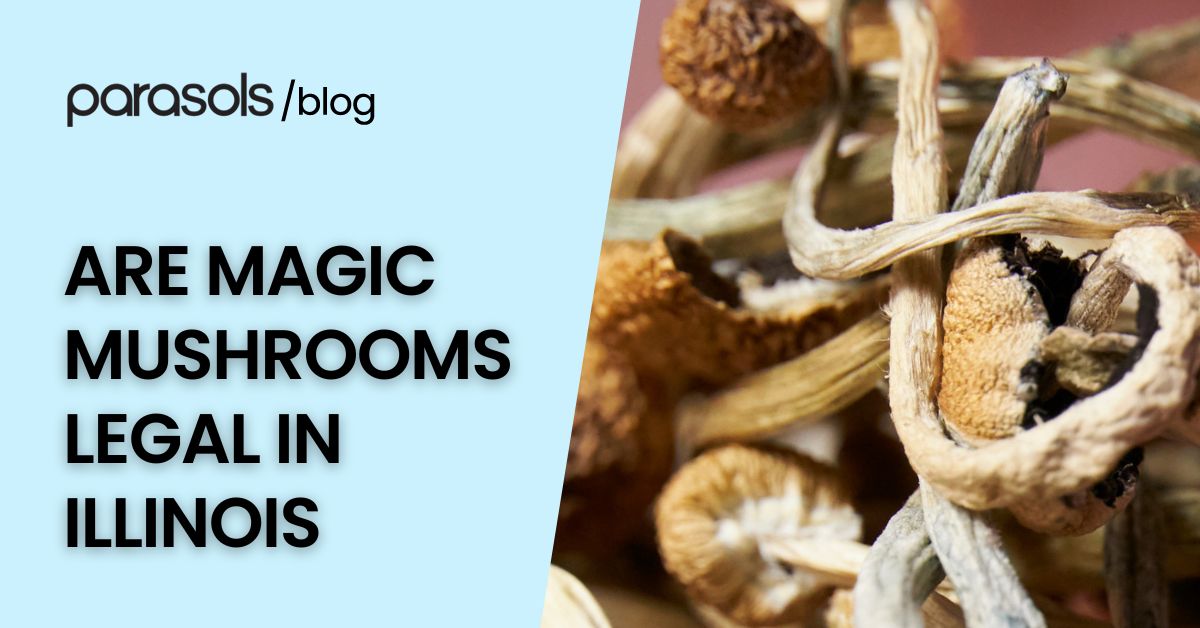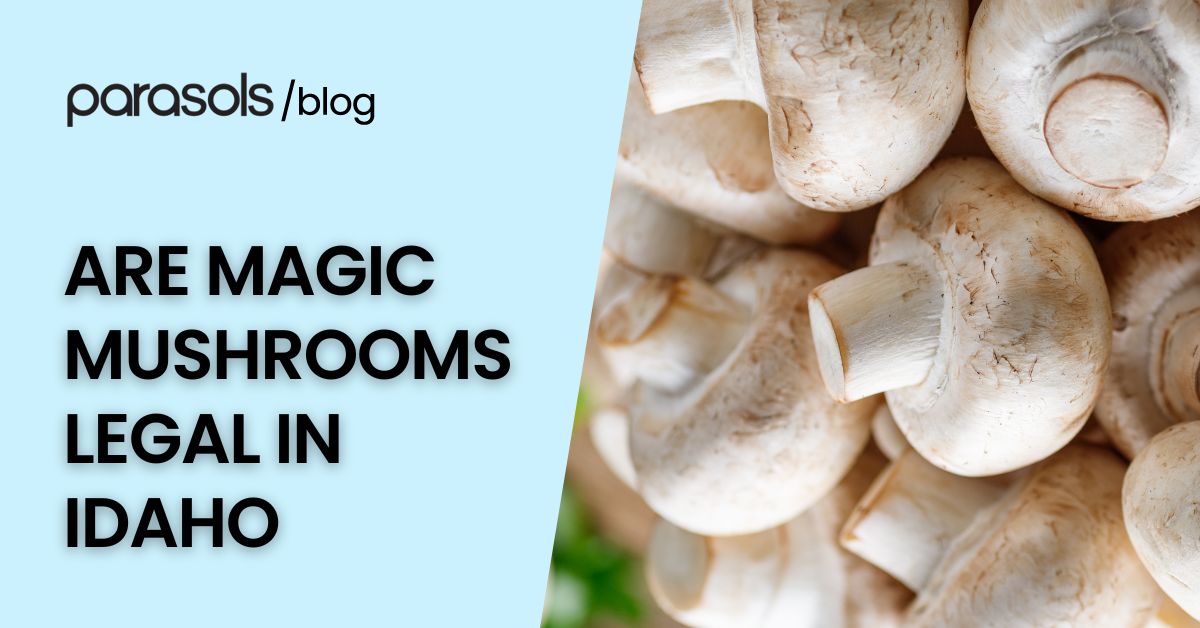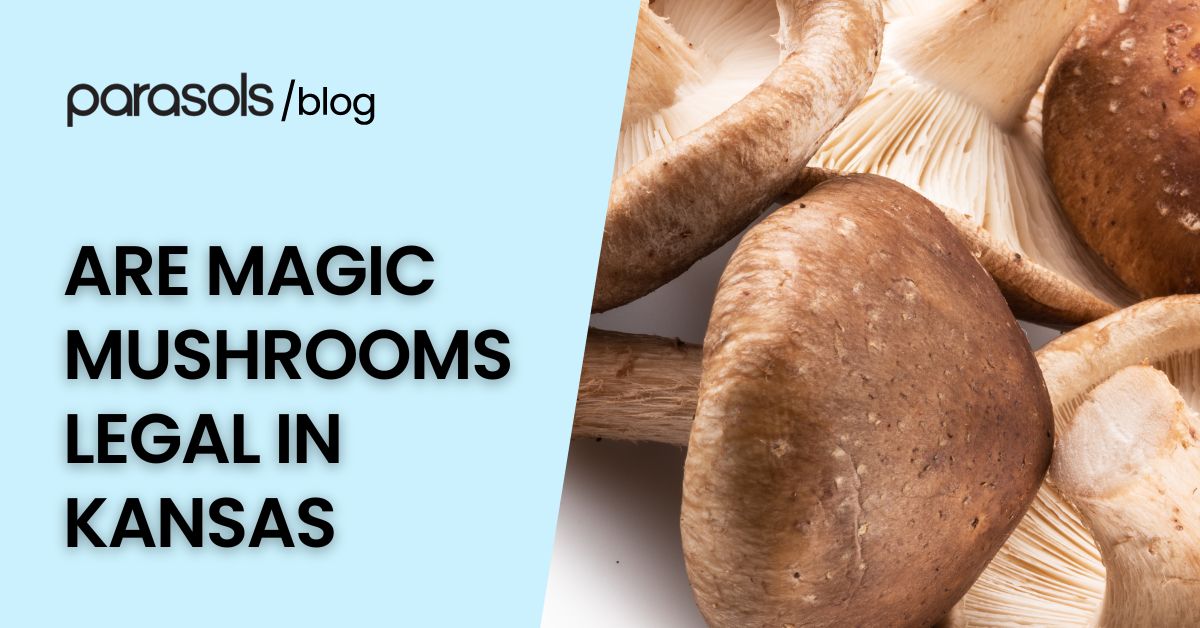With all the headlines lately about magic mushrooms and their potential to help with depression, PTSD, and other mental health issues, a lot of people in Illinois are starting to ask: Are psilocybin mushrooms legal here? And if not, could that change anytime soon?
Key Takeaways
- Psilocybin mushrooms remain illegal in Illinois as a Schedule I controlled substance.
- Proposed bills like the CURE Act and SB 2184 aim to allow psilocybin-assisted therapy under regulation.
- Possession, sale, or cultivation can lead to felony charges and severe penalties.
- Legal alternatives include ketamine therapy, functional mushrooms, TMS, and mindfulness practices.
- Illinois is in a transitional phase, with growing momentum toward potential reform.
What is a Magic Mushroom?
Magic mushrooms are a type of fungi that contain psilocybin—a naturally occurring psychedelic compound known for creating altered states of consciousness. Often called psilocybin mushrooms or psychedelic mushrooms, they’ve been used in Native American spirituality and traditional medications for generations.
Lately, they’ve been getting attention in Illinois and beyond for something very different: mental health. Preliminary studies suggest psilocybin could play a role in treating depression, post traumatic stress disorder, and other mental health issues. While they remain illegal in many places, the conversation around their potential therapeutic benefits is definitely growing.
Are Magic Mushrooms Legal in Illinois?

Right now, magic mushrooms are still illegal in Illinois. Psilocybin—the naturally occurring psychedelic compound found in these mushrooms—is classified as a Schedule I controlled substance under both state and federal law. That means it’s not considered to have any accepted medical use and is seen as having a high potential for abuse.
That said, things may be slowly shifting. Illinois lawmakers, including State Rep. La Shawn Ford, have introduced proposed legislation like the CURE Act, which aims to study psilocybin-assisted therapy for mental health treatment. There's growing recognition of the potential therapeutic benefits of psilocybin, especially for conditions like depression, post traumatic stress disorder, and end-of-life care.
But for now, under current Illinois law, possession or use of psilocybin mushrooms can still lead to serious consequences.
Current Laws for Magic Mushrooms in IL
Illinois is in a transitional phase when it comes to psilocybin mushrooms. While magic mushrooms are still illegal under current law, state lawmakers are actively pushing for reforms that could change how these psychedelic drugs are viewed—especially in the context of mental health treatment.
Current Legal Status of Psilocybin in Illinois
Psilocybin, the naturally occurring psychedelic compound in magic mushrooms, is currently classified as a Schedule I controlled substance under both federal and Illinois law. That classification means psilocybin is seen as having no accepted medical use and a high potential for abuse.
Because of this, the possession, sale, or cultivation of psilocybin mushrooms in Illinois remains illegal. Violations can lead to serious consequences, including felony charges and prison time. Law enforcement continues to treat these offenses seriously, even as public conversation shifts toward therapeutic potential.
Legislative Efforts Toward Legalization
Several Illinois lawmakers have introduced bills aimed at changing how the state regulates psilocybin:
- House Bill 1143 – The CURE Act: Sponsored by State Rep. La Shawn Ford, this bill proposes removing psilocybin from the Schedule I list at the state level. It would allow adults 21 and older to access psilocybin products for supervised, therapeutic use. It also outlines a regulatory framework for psilocybin service centers, training for licensed facilitators, and a 15% tax on psilocybin.
-
Senate Bill 2184: This bill calls for the creation of the Illinois Psilocybin Advisory Board. The board would be responsible for developing regulatory frameworks, licensing standards, and safety guidelines for future psilocybin-assisted therapy programs.
Both bills aim to move away from criminalization and toward safe, structured access for mental health purposes—not recreational use.
Potential Implications for Mental Health Treatment
With increasing interest in treatment options beyond traditional medications, psilocybin-assisted therapy is gaining momentum. Preliminary studies suggest psilocybin may reduce symptoms of depression, post traumatic stress disorder, and end of life anxiety in cancer patients.
Some research points to benefits like improved emotional processing, reduced avoidance behaviors, and even the formation of new neural connections. If either of these bills moves forward, psilocybin therapy could soon become a legal option for Illinois residents looking for relief from serious mental health issues.
Consequences of Magic Mushroom Use and Possession in Illinois
Despite growing interest in the potential therapeutic benefits of psilocybin, magic mushrooms remain illegal in Illinois. Psilocybin is still classified as a Schedule I controlled substance under both state and federal law. That means using, growing, or sharing psilocybin mushrooms can lead to serious consequences under Illinois law.
Here’s what that can look like in practice:
- Possession of Psilocybin Mushrooms: Treated as a Class 4 felony—even for small amounts. Penalties include 1 to 3 years in prison and fines up to $25,000.
- Possession of Larger Quantities: If you're caught with over 200 grams of psilocybin mushrooms, charges increase to a Class 1 felony. That could mean 4 to 15 years behind bars.
- Sale or Distribution: Giving away or selling psychedelic mushrooms is considered a Class 3 felony, punishable by 2 to 5 years in prison and fines up to $50,000.
- Cultivation of Psilocybin Mushrooms: Growing magic mushrooms is classified as drug manufacturing—a Class 2 felony—which can result in 3 to 7 years in prison.
- Trafficking or Transport: Moving large amounts of psilocybin, especially across state lines, can lead to a Class X felony. This carries the most severe penalties: 6 to 30 years in prison and fines up to $500,000.
-
First-Time Offender Programs: In some cases, individuals facing possession charges for the first time may be eligible for alternatives like court supervision, probation, or treatment-focused diversion programs—though this depends on the specifics of the case.
Alternatives to Shrooms in IL

While psilocybin mushrooms and other psychedelic drugs remain illegal in Illinois, there are several legal alternatives that may support mental health, emotional processing, and overall well-being. These options are currently accessible and may offer benefits without violating Illinois law.
- Ketamine-Assisted Therapy: Available through licensed clinics, ketamine has been approved for treatment-resistant depression. Unlike psilocybin, it’s not classified as a Schedule I drug and is administered by medical professionals under supervision.
- Functional Mushrooms: Non-psychedelic mushrooms like lion’s mane, reishi, and cordyceps are legal and widely used for their potential to support mood balance, cognitive function, and immune health. While they don’t contain psilocybin, they’re part of a growing interest in natural treatment options.
- Amanita muscaria Mushrooms: This legal mushroom contains psychoactive compounds, but not psilocybin. Its effects are different from psilocybin mushrooms and should be approached with caution, as potential risks are still being studied.
- Cognitive Behavioral Therapy (CBT): A long-standing, evidence-based approach for managing depression, anxiety, and other mental health issues. CBT is widely accessible and often covered by insurance.
- Transcranial Magnetic Stimulation (TMS): FDA-approved and non-invasive, TMS uses magnetic pulses to stimulate specific parts of the brain involved in mood regulation. It’s an alternative for those who haven’t responded well to traditional medications.
-
Mindfulness and Meditation: Practices like breathwork, meditation, and guided visualization can help reduce symptoms of stress, depression, and anxiety. These approaches are legal, accessible, and supported by research in emotional processing and mental health improvement.
Final Thoughts
Illinois hasn’t legalized magic mushrooms yet, but interest in their therapeutic potential is growing. Preliminary studies suggest psilocybin may help with mental health treatment, and lawmakers continue to debate proposed legislation.
For now, psilocybin mushrooms remain illegal under Illinois law, so it’s important to know the risks and learn safe, legal alternatives.
Stay informed on legal options and upcoming changes by reading our guide to psilocybin laws and mental health treatment in Illinois.
Frequently Asked Questions
Can you get a prescription for psilocybin in Illinois?
No. Psilocybin is currently classified as a Schedule I controlled substance under Illinois law, meaning it has no accepted medical use. As a result, healthcare providers in Illinois cannot prescribe psilocybin for mental health treatment or any other condition.
Are there any psilocybin clinical trials available in Illinois?
Some research institutions in Illinois may take part in federally approved clinical trials involving psilocybin mushrooms. However, these studies are limited, highly regulated, and often only open to participants who meet strict eligibility criteria. Research continues, but access is not widely available.
Is microdosing psilocybin legal in small amounts?
No. Even in very small amounts, microdosing psilocybin is considered illegal in Illinois.
Possession of psilocybin mushrooms—even for personal or non-recreational use—is treated as possession of a controlled substance and may carry serious consequences under state law.
Are magic mushrooms legal for religious or spiritual use?
Currently, Illinois law does not recognize any religious or spiritual exemptions for using psilocybin mushrooms. While psilocybin has a history of ceremonial use in Native American spirituality and other traditions, the state still considers all possession and use illegal.
Can law enforcement use discretion for psilocybin-related offenses?
Technically, yes—but only to a point. Some law enforcement agencies may choose to make psilocybin-related offenses a lower priority. However, because psilocybin remains illegal statewide, officers still have the authority to arrest and charge individuals under existing controlled substances laws.
Is psilocybin legal for use in therapy settings?
Not yet. Although bills like the CURE Act and other proposed legislation suggest psilocybin-assisted therapy could become a legal treatment option in the future, it is not currently allowed. Until new regulatory frameworks are passed and implemented, psilocybin remains off-limits for therapeutic use in Illinois.



Leave a comment
This site is protected by hCaptcha and the hCaptcha Privacy Policy and Terms of Service apply.